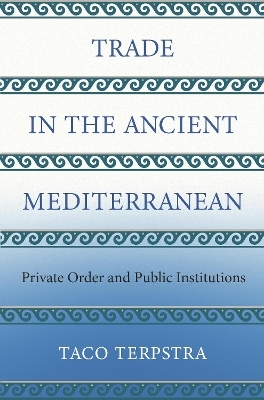
Trade in the Ancient Mediterranean
Private Order and Public Institutions
Seiten
2019
Princeton University Press (Verlag)
978-0-691-17208-8 (ISBN)
Princeton University Press (Verlag)
978-0-691-17208-8 (ISBN)
How ancient Mediterranean trade thrived through state institutionsFrom around 700 BCE until the first centuries CE, the Mediterranean enjoyed steady economic growth through trade, reaching a level not to be regained until the early modern era. This process of growth coincided with a process of state formation, culminating in the largest state t
How ancient Mediterranean trade thrived through state institutions
From around 700 BCE until the first centuries CE, the Mediterranean enjoyed steady economic growth through trade, reaching a level not to be regained until the early modern era. This process of growth coincided with a process of state formation, culminating in the largest state the ancient Mediterranean would ever know, the Roman Empire. Subsequent economic decline coincided with state disintegration. How are the two processes related?
In Trade in the Ancient Mediterranean, Taco Terpstra investigates how the organizational structure of trade benefited from state institutions. Although enforcement typically depended on private actors, traders could utilize a public infrastructure, which included not only courts and legal frameworks but also socially cohesive ideologies. Terpstra details how business practices emerged that were based on private order, yet took advantage of public institutions.
Focusing on the activity of both private and public economic actors—from Greek city councilors and Ptolemaic officials to long-distance traders and Roman magistrates and financiers—Terpstra illuminates the complex relationship between economic development and state structures in the ancient Mediterranean.
How ancient Mediterranean trade thrived through state institutions
From around 700 BCE until the first centuries CE, the Mediterranean enjoyed steady economic growth through trade, reaching a level not to be regained until the early modern era. This process of growth coincided with a process of state formation, culminating in the largest state the ancient Mediterranean would ever know, the Roman Empire. Subsequent economic decline coincided with state disintegration. How are the two processes related?
In Trade in the Ancient Mediterranean, Taco Terpstra investigates how the organizational structure of trade benefited from state institutions. Although enforcement typically depended on private actors, traders could utilize a public infrastructure, which included not only courts and legal frameworks but also socially cohesive ideologies. Terpstra details how business practices emerged that were based on private order, yet took advantage of public institutions.
Focusing on the activity of both private and public economic actors—from Greek city councilors and Ptolemaic officials to long-distance traders and Roman magistrates and financiers—Terpstra illuminates the complex relationship between economic development and state structures in the ancient Mediterranean.
Taco Terpstra is assistant professor of classics and history at Northwestern University. He is the author of Trading Communities in the Roman World.
| Erscheinungsdatum | 22.03.2019 |
|---|---|
| Reihe/Serie | The Princeton Economic History of the Western World |
| Zusatzinfo | 9 b/w illus. 6 maps. |
| Verlagsort | New Jersey |
| Sprache | englisch |
| Maße | 155 x 235 mm |
| Themenwelt | Geschichte ► Allgemeine Geschichte ► Vor- und Frühgeschichte |
| Geschichte ► Teilgebiete der Geschichte ► Wirtschaftsgeschichte | |
| Wirtschaft ► Allgemeines / Lexika | |
| ISBN-10 | 0-691-17208-0 / 0691172080 |
| ISBN-13 | 978-0-691-17208-8 / 9780691172088 |
| Zustand | Neuware |
| Informationen gemäß Produktsicherheitsverordnung (GPSR) | |
| Haben Sie eine Frage zum Produkt? |
Mehr entdecken
aus dem Bereich
aus dem Bereich
Was Pompeji über uns erzählt
Buch | Hardcover (2023)
Propyläen (Verlag)
CHF 44,75
auf den Spuren der frühen Zivilisationen
Buch | Hardcover (2023)
C.H.Beck (Verlag)
CHF 27,95


